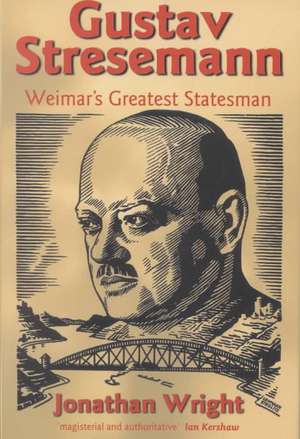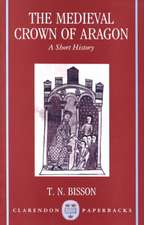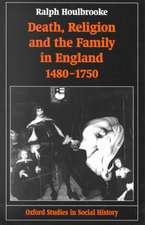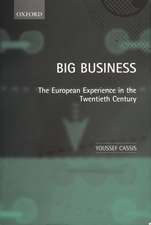Gustav Stresemann: Weimar's Greatest Statesman
Autor Jonathan Wrighten Limba Engleză Hardback – 10 oct 2002
| Toate formatele și edițiile | Preț | Express |
|---|---|---|
| Paperback (1) | 493.75 lei 31-37 zile | |
| OUP OXFORD – 16 sep 2004 | 493.75 lei 31-37 zile | |
| Hardback (1) | 405.93 lei 31-37 zile | |
| OUP OXFORD – 10 oct 2002 | 405.93 lei 31-37 zile |
Preț: 405.93 lei
Preț vechi: 535.72 lei
-24% Nou
Puncte Express: 609
Preț estimativ în valută:
77.69€ • 80.07$ • 65.59£
77.69€ • 80.07$ • 65.59£
Carte tipărită la comandă
Livrare economică 20-26 februarie
Preluare comenzi: 021 569.72.76
Specificații
ISBN-13: 9780198219491
ISBN-10: 0198219490
Pagini: 606
Ilustrații: 26 halftones, frontispiece
Dimensiuni: 163 x 242 x 37 mm
Greutate: 1.08 kg
Editura: OUP OXFORD
Colecția OUP Oxford
Locul publicării:Oxford, United Kingdom
ISBN-10: 0198219490
Pagini: 606
Ilustrații: 26 halftones, frontispiece
Dimensiuni: 163 x 242 x 37 mm
Greutate: 1.08 kg
Editura: OUP OXFORD
Colecția OUP Oxford
Locul publicării:Oxford, United Kingdom
Recenzii
Wright presents a rich multifaceted picture that soildly rests on contemporary evidence...well written book
This biography is detailed, shows measured judgment, and leaves a sympathetic impression of its subject ... the book presents a powerful image of a deeply patriotic politician.
Jonathan Wright has written a full-scale academic biography directed at an international specialist readership ... this work will set new standards in research.
Wright provides a balanced account of Stresemann's chancellorship in 1923, doing justice to its significance. This part is not merely fundamental reading for anyone interested in Stresemann; it sets new standards for Weimar historiography. The same applies to Wright's description and analysis of German foreign policy between 1924 and 1929.
This is a great work which will take some superseding in form and content.
[Wright] has produced a thorough, well researched study of the man he sees as "Weimar's Greatest Statesman" ... Wright's interest is in Stresemann as the political leader and the foreign minister, and the book is tightly and clearly focused on this interest. Maps, photographs and a glossary enhance the work ... Scholars will find it the most thorough, up-to-date political study of Stresemann available in English.
A serious biography of another chancellor that offers a good basis for a compare-and-contrast study of modern and Weimar Germany.
... sympathetic and authoritative biographer ... Wright provides a full and persuasive account of Stresemann's professional progression.
It is an elegantly-written book that persuasively makes the case for Stresemann's indispensability to the poor old Weimar Republic.
Well researched new biography.
Lucid and authoritative.
Absorbing and well argued book.
In this major new book, based on wide reading in Stresemann's private papers, German, British and French archives, and the voluminous diplomatic record of the times, the Oxford historian Jonathan Wright mounts a subtle, nuanced and on the whole convincing defence against [such] criticism [of Stresemann].
Meticulously researched and authoritative biography.
... the first comprehensive biography in English of one of Germany's three greatest diplomats ... an admirably old-fashioned, academic biography: lucidly and crisply written, it deftly bridges domestic politics and diplomacy.
Indispensable for understanding both interwar diplomacy--one of the most important and complex subjects of modern history--and the German problem, a conundrum perhaps still with us.
If Gustav Stresemann, an enigmatic and controversial figure, had not died prematurely in 1929, Germany might just have avoided a Hitler dictatorship. Jonathan Wright's magisterial and authoritative study is to be warmly welcomed as an unrivalled biography of the most important European statesman of the 1920s.
Wright's book is monumental in its research.
This biography is detailed, shows measured judgment, and leaves a sympathetic impression of its subject ... the book presents a powerful image of a deeply patriotic politician.
Jonathan Wright has written a full-scale academic biography directed at an international specialist readership ... this work will set new standards in research.
Wright provides a balanced account of Stresemann's chancellorship in 1923, doing justice to its significance. This part is not merely fundamental reading for anyone interested in Stresemann; it sets new standards for Weimar historiography. The same applies to Wright's description and analysis of German foreign policy between 1924 and 1929.
This is a great work which will take some superseding in form and content.
[Wright] has produced a thorough, well researched study of the man he sees as "Weimar's Greatest Statesman" ... Wright's interest is in Stresemann as the political leader and the foreign minister, and the book is tightly and clearly focused on this interest. Maps, photographs and a glossary enhance the work ... Scholars will find it the most thorough, up-to-date political study of Stresemann available in English.
A serious biography of another chancellor that offers a good basis for a compare-and-contrast study of modern and Weimar Germany.
... sympathetic and authoritative biographer ... Wright provides a full and persuasive account of Stresemann's professional progression.
It is an elegantly-written book that persuasively makes the case for Stresemann's indispensability to the poor old Weimar Republic.
Well researched new biography.
Lucid and authoritative.
Absorbing and well argued book.
In this major new book, based on wide reading in Stresemann's private papers, German, British and French archives, and the voluminous diplomatic record of the times, the Oxford historian Jonathan Wright mounts a subtle, nuanced and on the whole convincing defence against [such] criticism [of Stresemann].
Meticulously researched and authoritative biography.
... the first comprehensive biography in English of one of Germany's three greatest diplomats ... an admirably old-fashioned, academic biography: lucidly and crisply written, it deftly bridges domestic politics and diplomacy.
Indispensable for understanding both interwar diplomacy--one of the most important and complex subjects of modern history--and the German problem, a conundrum perhaps still with us.
If Gustav Stresemann, an enigmatic and controversial figure, had not died prematurely in 1929, Germany might just have avoided a Hitler dictatorship. Jonathan Wright's magisterial and authoritative study is to be warmly welcomed as an unrivalled biography of the most important European statesman of the 1920s.
Wright's book is monumental in its research.











